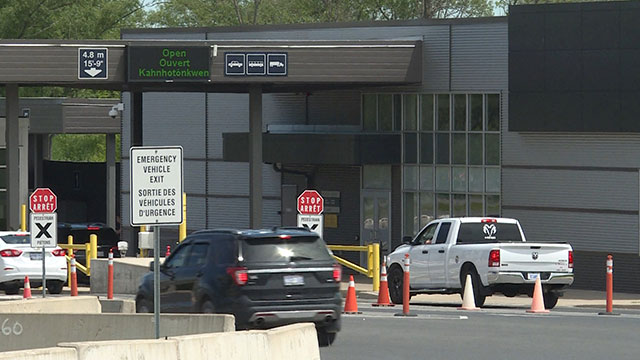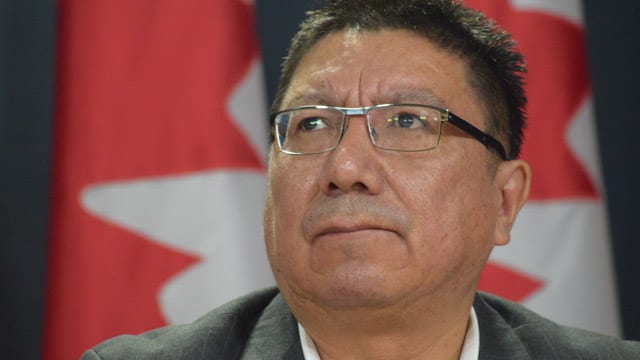
Three people have tested positive for COVID-19 in two different communities in southern Ontario.
Two people tested positive in Six Nations of the Grand River and one person was confirmed to have the virus in Chippewas of Kettle and Stony Point First Nation.
“We know we couldn’t stop it from being here. It’s here,” Mark Hill, elected chief of Six Nations, said on Sunday.
“We can however stop it from spreading, because being around people is how it travels. Stay home. Connect with your family and friends by phone or social media and stop gathering in groups.”
Ohsweken Public Health began tracing and reaching out to those who had contact with both individuals, Hill said.
The Mohawk community of Akwesasne also confirmed one person tested positive.
Akwesasne is split by the Canada-U.S. border straddling Ontario and New York.
In a joint statement, Saint Regis Mohawk Tribe and the Mohawk Council of Akwesasne didn’t say which side of the border the positive case was found, but the Franklin County Public Health Department in the U.S. said it was investigating.
The statement also said that their community member who tested positive was in quarantine and receiving follow-up care.
The novel coronavirus has hit New York State with 59,513 positive cases. There were only six in Franklin county as of Sunday afternoon, however.

(Cars pass through the border crossing at Akwesasne. Photo: APTN)
The Chippewas of Kettle and Stony Point said that the person who tested positive in the community received treatment and that their close contacts had been told to self-isolate.
“With the announcement yesterday of a community member testing positive and the increased spread of COVID-19 in our county, it’s with humble heart that I come to you and appeal to you to stay home, shelter in place and don’t travel,” said Kettle and Stony Point Chief Jason Henry in a video update on Sunday.
All three communities are relatively close to urban centres and the U.S. border. Both Six Nations and Kettle and Stony Point are putting in new measures to restrict travel through their territories.
“We’ve been seeking legal advice, working with the police, working with our lawyers, working with the Anishinabek Nation, Chiefs of Ontario to try and find a good way to close the community to some degree,” Henry added.
The Lake Huron community also asked cottagers to stay home, closed roads and set up screening booths to limit travel through the territory.
“The fact is that many First Nations people have compromised health and limited access to health care. Our community relies on the tourist industry to support our economy but this decision was made to protect lives,” the community posted to its Facebook page.
Six Nations announced similar measures.
“Starting next week,” Hill said on Sunday, “we will be conducting checkpoints at our community entrances. This marks a drastic increase in our COVID-19 prevention efforts and also provides an opportunity for our front-line workers to monitor those entering and exiting our community.”
Hill also asked smoke shops to close and for gas stations to suspend tobacco sales for the time being.
“At this time, I’d like to question what is more important at this point: the sale of cigarettes and money or the health and safety of our community?” Hill asked.
Akwesasne urged travelers returning from anywhere beyond a 50-mile radius to self-isolate.
“This includes those who traveled for non-essential and essential purposes; including for work, vacation, school, release from incarceration or other reasons. This is to prevent the spread of the Coronavirus from areas experiencing an outbreak,” the two councils said on Friday.

(Nishnawbe Aski Nation (NAN) Grand Chief Alvin Fiddler. Photo: APTN)
Northern Ontario First Nation communities still COVID-19 free
In a Friday memo, Nishnawbe Aski Nation (NAN) Grand Chief Alvin Fiddler reported no confirmed cases in the territory.
NAN, which represents 49 First Nation communities in northern Ontario, said member nations should declare community level states of emergency.
“With urban centers having positive COVID-19 cases, community spread is likely and will quickly challenge current resources.”
There were two cases within the community of Thunder Bay and one in the local hospital, the city reported on Sunday.
Many of NAN’s constituent communities – remote and accessible only by air or winter road – already declared states of emergency, locked down borders and restricted non-essential travel.
Kitchenuhmaykoosib Inninuwug (K.I.) First Nation shut down all non-essential flights, with the exception of medical emergencies, in and out of the community beginning Saturday evening.
Chief and council said no passenger, cargo or charter aircraft would be permitted in or out, with only one carrier, Wasaya Airlines, excepted.
Northern Quebec is taking similar measures.
One person tested positive in Salluit, which is located in the Inuit territory of Nunavik in sub-Arctic Quebec.
The Kativik Regional Government (KRG) imposed a curfew throughout the entire Nunavik region a day later.
“Access to all airports in Nunavik is restricted. Only personnel offering priority services and cargo are authorized to land in the community,” Kativik Regional Police said in a Sunday press release.
The Quebec government moved to established police checkpoints to protect seven other regions extending to the Lower-St-Lawrence, Abitibi-Temiscamingue, North Shore, Northern Quebec, Cree Territory in James Bay, Gaspe-Iles-de-la-Madeleine and Saguenay-Lac-St-Jean.
Deputy premier Genevieve Guilbault announced the measures Saturday.
She said if people attempting to enter or leave the regions “are not an essential service, if they are not going for health reasons or for humanitarian reasons, they will be sent home.”
According to the federal government’s Monday update, Quebec had 2,840 confirmed cases and 22 deaths.
Ontario had 1,355 cases and 23 deaths. In Canada, the total number of confirmed cases was 6,317 with 66 deaths.
-With files from The Canadian Press









